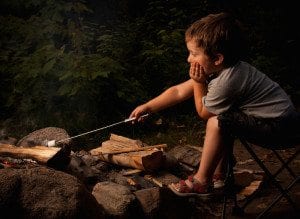Residing in Cheviot Hills means we are lucky to live within the district of two superior elementary schools: Overland and Castle Heights. Parts of Beverlywood are in the district of Canfield Elementary, another fine learning institution. Each of these schools offers small class sizes, incredible teachers and administrators, strong diversity and an incomparable curriculum. And they also provide another strong example of how schools (and parents for that matter!) in America differ from those in Germany.
An article ran in The Wall Street Journal recently illustrating a rather unique cultural tradition in many German kindergartens: overnight camping excursions for children aged 3-6 to learn survival skills. Parents are not allowed to attend and communication with campers and teacher chaperones is severely frowned upon. Children barely out of diapers are brought out to woodsy campgrounds or Tom Sawyeresque islands and expected to learn how to get themselves dressed, prepare meals and put themselves to bed, all without the helicoptering help of mom and dad. In some instances, these children are given knives to carve wood into skewers in order to roast their own sausages and all of the young campers are encouraged to be independent and play creatively in the woods, often out of the watchful eyesight of their teachers. Another aspect of the trip is to learn how to take care of one another. If one baby camper is homesick, it’s up to his friends to help assuage fears and provide comfort when necessary.
 These trips called, ‘Kitafahrten,’ promote a concept that is as old as kindergarten itself. They date back as far as Friedrich Frobel, the 19th century German educator who created Kindergarten in the first place. He was a strong proponent of children playing in nature and learning from their experiences, an idea that is put into practice during these weekend trips. He also believed that children are capable of much more than parents give them credit for. He felt that kids will rise to challenges and parents often hinder their natural inclination to soar independently.
These trips called, ‘Kitafahrten,’ promote a concept that is as old as kindergarten itself. They date back as far as Friedrich Frobel, the 19th century German educator who created Kindergarten in the first place. He was a strong proponent of children playing in nature and learning from their experiences, an idea that is put into practice during these weekend trips. He also believed that children are capable of much more than parents give them credit for. He felt that kids will rise to challenges and parents often hinder their natural inclination to soar independently.
Maybe Mr. Frobel has a point. There is certainly a lot of fear and concern in raising 21st century children, especially on the Westside of Los Angeles. We hesitate even letting our boys walk the dog around the block let alone leave them in the forest for three days with minimal supervision. Maybe we need to let go a little and allow them the survival skills to realize that, even at very young ages, they have the power to survive.
Now that my youngest son is 6, it’s hard to say if I would’ve let him participate in this German cultural tradition, had Castle Heights offered it. I think my fear for his safety would’ve overridden the possible good that could’ve come out of it. I’m definitely all for survival skills, but learning them at 3? Something tells me, in this day and age, it’s OK to wait a few years before turning them loose in the wilderness with fingers crossed, hoping they survive. But, on the other hand, I definitely want to foster independence and strength in our boys, and maybe starting early is the right way to go? But one thing is for certain: if this is how Germans usher in kindergarten, I’m not sure I want to know how they tackle middle school.


Leave A Comment